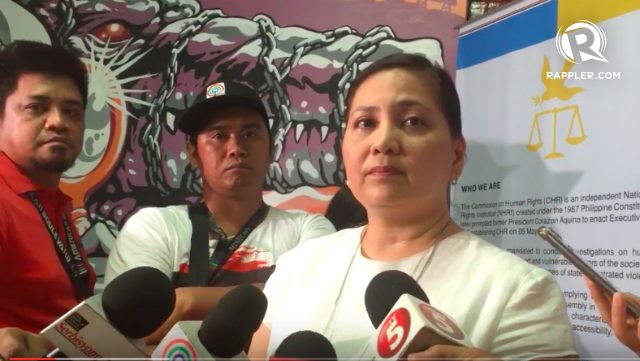SUMMARY
This is AI generated summarization, which may have errors. For context, always refer to the full article.

MANILA, Philippines – The Commission on Human Rights on Monday, May 8, hit back at Senator Alan Peter Cayetano for claiming that the commission was among those who “deceived” the world regarding the facts surrounding President Rodrigo Duterte’s war on drugs.
During his opening statement before United Nations member states in Geneva, Cayetano claimed that the CHR and the local media changed the definition of “extrajudicial killings” (EJKs) to lead the public and foreign media to believe that there has been a new wave of killings under the Duterte administration. (READ: Cayetano to UN: No new wave of killings in PH)
The senator, Duterte’s losing running mate in the 2016 elections, led Philippine officials in reporting on the status of human rights in the country in the last 4 years, covering the last years of the Aquino administration and 9 months of the Duterte presidency.
“No, we did not change the definition [of extrajudicial killings],” CHR Commissioner Karen Gomez Dumpit told reporters after the live stream of the Universal Periodic Review (UPR).
Cayetano said Administrative Order 35, signed by President Benigno Aquino III, defined EJKs as killings of members or advocates of cause-oriented organizations, such as labor, environment, and the media.
“In the current administration, a different definition is being used,” Cayetano said. “EJK now refers to any death outside of those caused by natural causes, accidents, or those ordered by the courts.”
Commissioner Dumpit, however, said the CHR has always adhered to international guidelines on the definition of EJKs, and that the definition the past administration used was based on what was happening at that time.
“What was mentioned in AO 35 just represents a prioritization of EJKs that were happening at that time. Right now, we know that the situation has changed,” she explained. “So we weren’t responsible for any change in definition as we always anchor our statements and our terms in accordance with international standards.”
Thorough investigation
Cayetano led the Philippine delegation who defended Duterte’s war on drugs and human rights record before the UN council. He insisted that there are no state-sponsored killings in the country.
However, at least 45 member states expressed concern regarding the rising number of deaths as Duterte’s war on drugs continues. They urged the government to conduct a “thorough” investigation and to hold accountable those behind the killings. (READ: Countries call for end to killings in PH drug war)
As of April 23, records of the Philippine National Police (PNP) showed that 2,717 suspected drug personalities were killed in legitimate police operations since the start of the Duterte administration. There are 3,603 deaths under investigation. (READ: IN NUMBERS: Philippines’ ‘war on drugs’)
The CHR, meanwhile, echoed the statement of the UN panel, adding that it is time to “see results” if the government said it is committed to upholding justice and human rights.
“We want to see results this time because it’s one thing to see the numbers, but we’d like to see the names behind those numbers, the cases filed behind those numbers,” Dumpit said.
She added that the commission, which has no powers to prosecute, is very willing to cooperate with law enforcers – if they themselves open up to the CHR.
“We are willing to cooperate with the prosecution and law enforcement agencies, and we hope that they will also cooperate with us fully by furnishing us copies, complete copies of autopsy reports, SOCO reports, on-the-spot reports, and other reports that we need in order for us to also conduct an independent investigation,” Dumpit said.
The CHR recently conducted a surprise inspection of a police station in Manila, and discovered that drug suspects were being held in a secret cell – a windowless room hidden behind a bookshelf – even after a week without being charged. The PNP criticized the commission for this, challenging it to conduct such inspections every day on all jails, and not just in Manila right before the start of the ASEAN Summit. – Rappler.com
Add a comment
How does this make you feel?
There are no comments yet. Add your comment to start the conversation.